|
We have been studying in a variety of fields to improve the performance of the digital hearing aids that recover some hearing impaired people. Specifically, our researches focus on the digital signal processing to improve the speech enhancement. We are researching digital hearing aids with high-quality sound and are developing algorithms and designs for signal processing. Digital hearing aids provide dramatic sound enhancement, improved communication ability and unequalled flexibility to match individual user needs. We are studying the techniques (companding, wide dynamic range compression etc.) which are generally related in the digital hearing aids. Also, we are interested in training induced auditory rehabilitation. Current research theme is auditory sensitivity enhancement by auditory sound training.
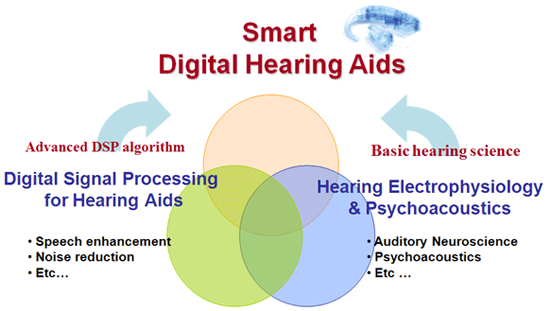
1. Hearing aid research
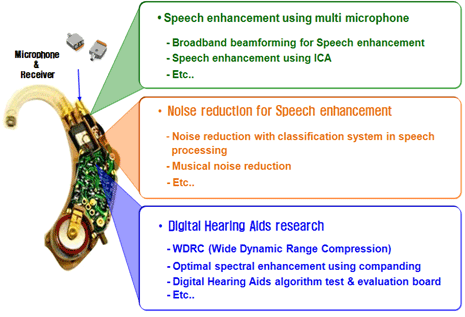
1.1. Noise reduction for Speech enhancement
- Noise reduction with classification system in speech processing
We combined a multiband spectral subtraction (MBSS) algorithm with a classification system to improve the performance and robustness of the noise reduction algorithm.
The classification system was developed with a support vector machine (SVM) using RBF kernel and classified noise signal into 4 different classes which were car interior
noise, babble noise, traffic noise and white noise. For each class, a respective frequency band in MBSS is multiplied by a weighting factor δ that comes from classifier.
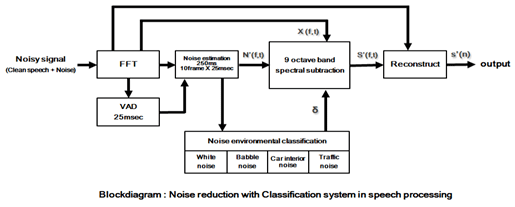
- Musical noise reduction
Musical noise, an annoying artifact, interferes speech intelligibility and quality of hearing impaired people. Effective combination of musical noise reduction
using post-filter and gain estimations (wiener filter, statistical estimation (mmse, logmmse)).
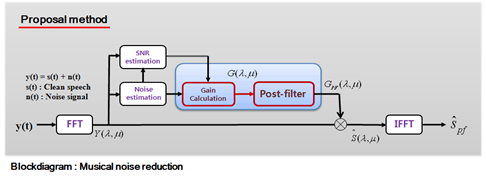
- Optimal spectral enhancement using companding
Spectral enhancement techniques (companding) have often been used in an attempt to improve speech intelligibility in noise for listeners with sensorineural hearing loss.
Once the companding parameters are optimized, and adaptive gain is significantly improved, the spectral contrast is enhanced and we can expect speech perception
in digital hearing aids.
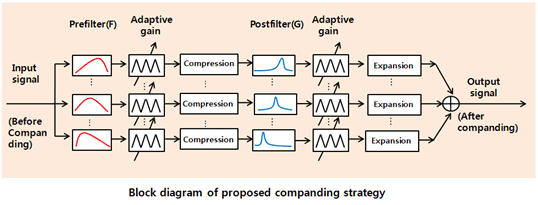
1.2. Speech enhancement using microphone
- Broadband Beamforming
When hearing impaired people listen to the sound, if there exists many sound sources, it is hard to distinguish the sound from desired direction. In digital hearing aids,
by allowing directivity, which means to preserve the sound from desired direction and to attenuate the sound from unwanted direction, the problem could be solved.
Beamforming using microphone array is proven to allow directivity. Designing FIR filters for each microphone by optimization which shows frequency invariant
beamformer response can lead to less distortion in speech.
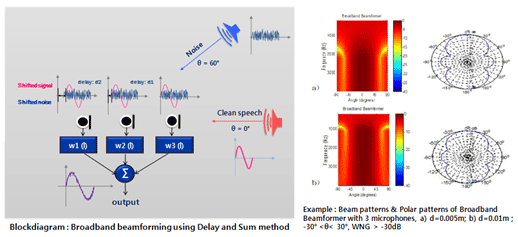
2. Hearing psychophysics research
2.1. Sensitivity enhancement of Hearing
- Sensitivity enhancement of Speech perception in noise by auditory training
In hearing impaired people, and hearing aid wearers who are not used to wearing hearing aids, speech perception ability in noise is decreased.
The decrease of speech perception ability in noise causes lives being difficult. To solve these problems, we are studying the sensitivity enhancement of speech perception
in background noise by auditory sound training.
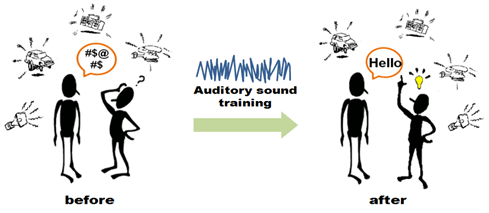
3. Project
Development of Environment-Independent Adaptive Hearing Aid using Wireless Communication. (Research supported by MKE, 2008. 12 ~ 2013.09) |
